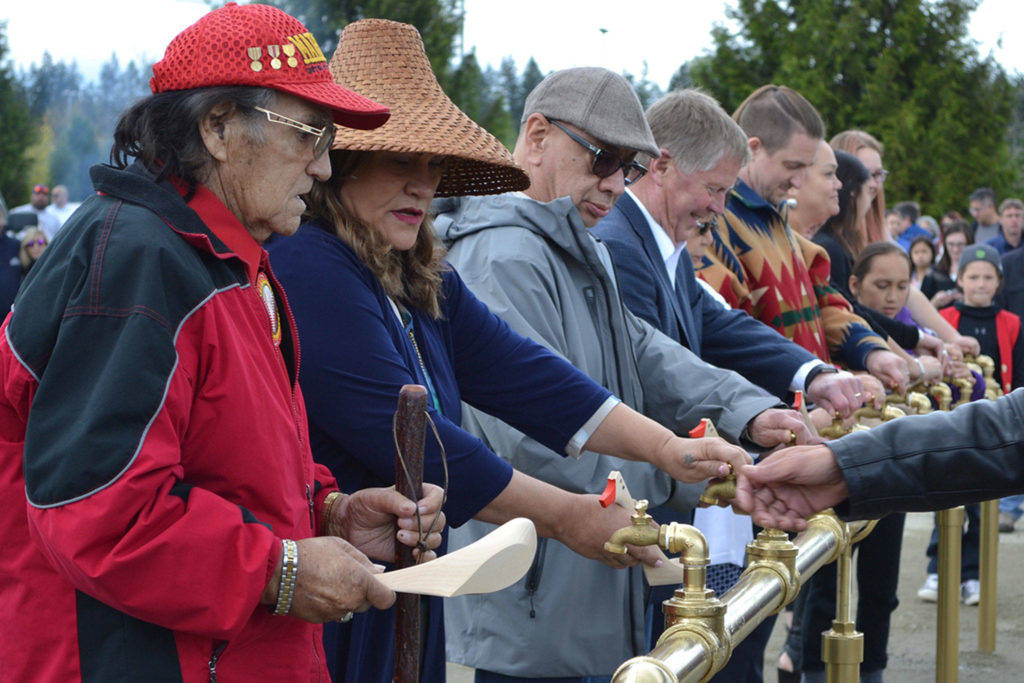TULALIP – Stan Jones, a longtime leader of the Tulalip Tribes, died Tuesday at the age of 93.
Jones was tribal chairman for 26 of the 44 years he was on the tribal council, retiring in 2010.
His daughter, Teri Gobin, is chairwoman of the tribes this year.
In an interview with The Globe in March, Gobin said she didn’t plan to follow in her father’s footsteps. She had seen enough watching him all those years. But she was talked into it because she wanted to bring the community back together and be a part of positive change.
The main advice he gave her: “It’s all about taking care of your people – figure out how to make their lives better.”
That’s what Jones did – in sometimes historic ways.
He helped revive the Tribal Salmon Ceremony in 1976, and was instrumental in forging the Boldt Fishing Treaty Decision, which ensured tribes would receive their treaty rights of half of all harvestable salmon in the state.
He was also appointed as first chairman of the Task Force on Indian Gaming, and negotiated the first tribal/state casino gaming compact. Ten years ago Jones was part of a ceremony that opened a Chevron on 116th Street. He recalled the tribes only had three employees 43 years ago, as opposed to the thousands of tribal employees in 2009.
“We’ve come a long way,” Jones told The Globe.
At his council retirement, he was honored.
“His leadership, including 24 years as our tribal chair, helped guide our economic development, which in turn allowed us to provide education assistance, health and dental services, a senior retirement home, cultural activities, housing, and child and social services for our people,” said Mel Sheldon, another longtime leader.
He also wrote a book called “‘Our Way’ Hoy yud dud,” a history of his life and the Tulalip Tribes as a whole.
He served in the Marine Corps in World War II and fed his rations to Hiroshima survivors in Japan.
He mingled with such famous people as Bill Gates, the Rev. Jesse Jackson, Nelson Rockefeller, Donald Trump and U.S. presidents Bill Clinton and George W. Bush. He spoke on Native American issues at the invitation of the United Nations in Geneva, Switzerland, regarding treaty and environmental issues, and in China and Italy regarding economic development, and his cultural exchange work took him to Goa, India, and New Zealand.
He also wrote about how tough is was growing up.
“When I was a kid, we got our flour from the government commissary, and they gave us sifters because it had worms,” Jones said. “People were starving on the reservation. There was no electricity. We had to use kerosene lamps for light and a milk can to fetch water. There was tuberculosis all over. My mom died when I was 3, and my brother and I got sent to Cushman Indian Hospital in Tacoma when I was 9. He passed away there, and I didn’t leave until I was 12.”
Jones recalled how Native American children were placed in government schools, away from their families, and denied the ability to learn their cultural heritage. “I don’t want these things to be forgotten,” Jones said. “It used to be that they took the language away from the young people, and punished them for speaking it, but now, it’s taught to them in the schools.”
Jones has also served as president of Quil Ceda Village and on the Tribes’ Gaming Hunting, Fishing and Business committees. Jones was married to his wife, JoAnn, for 70 years.
In the May interview, Gobin said she lived near her dad and had coffee with him every day. She said she shares his traits of being a hard worker and showing “compassion for his people.”
As for what she remembers most about her dad during all those years in office, she said it was his connections to the White House. She got to go with Jones to the Inaugural Ball the year Clinton famously played the saxophone.
Services are being planned for Monday at the Tulalip Casino Resort.



